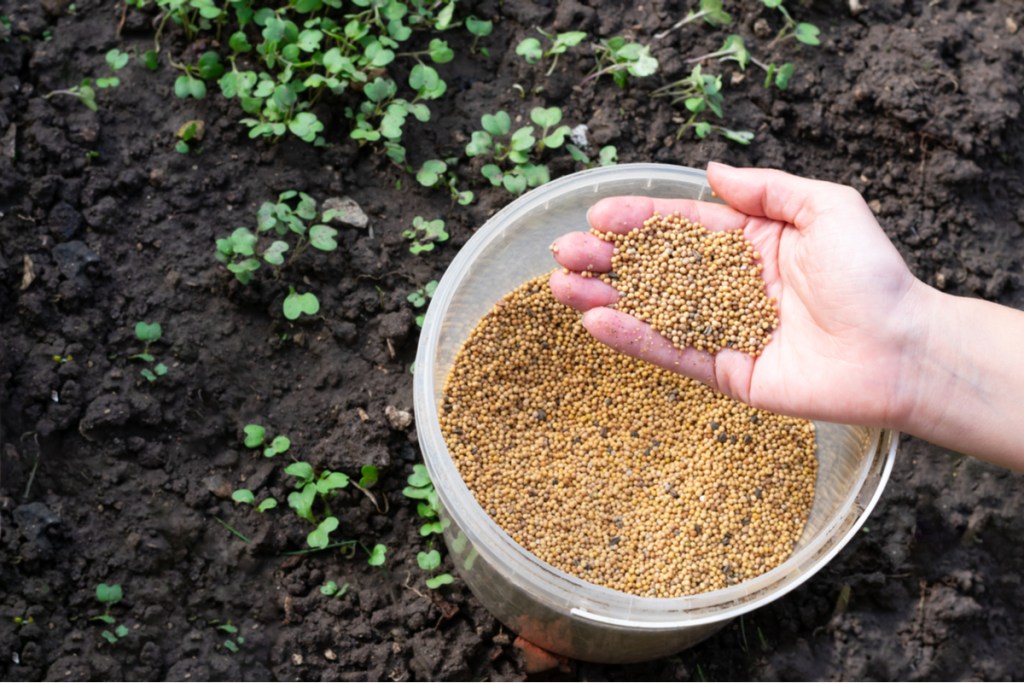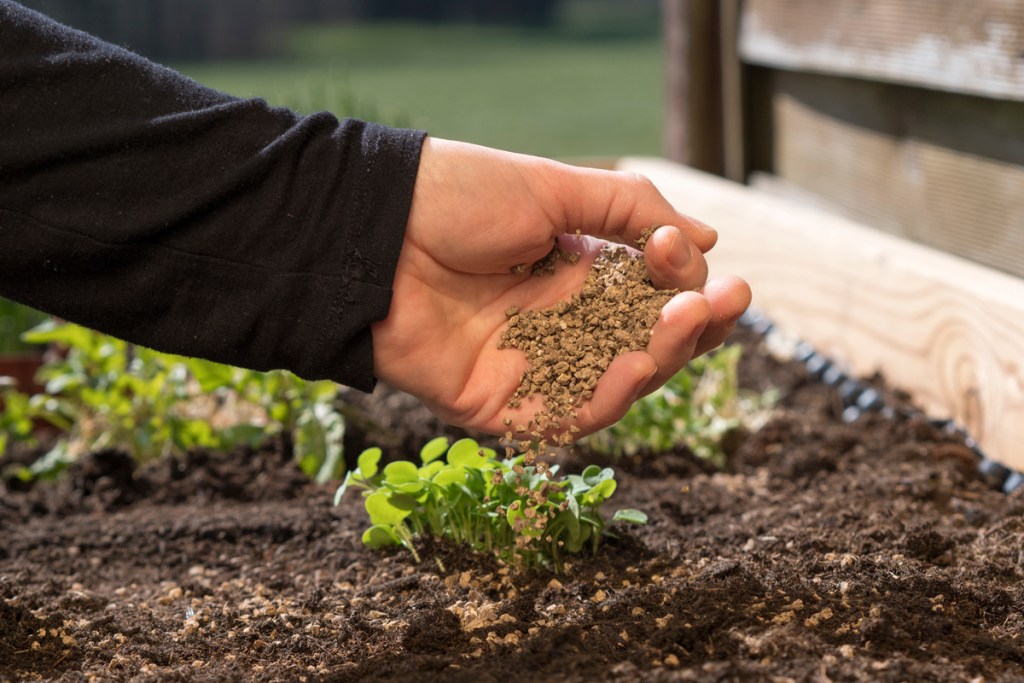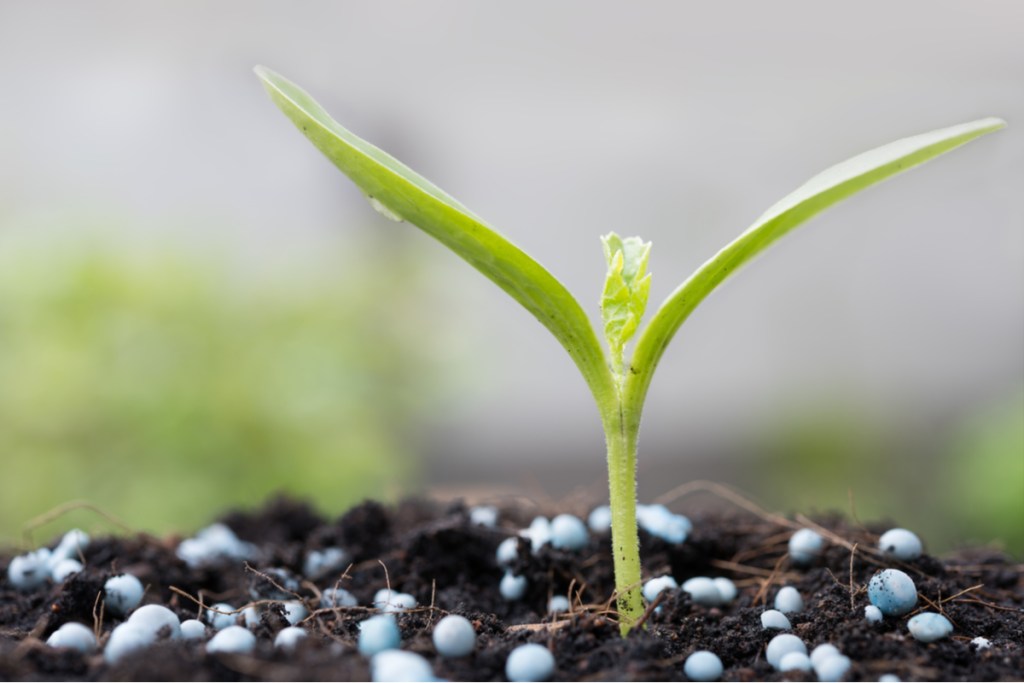
Like people, plants can benefit from nutritional supplements to help them live their best lives — except it’s much easier for plants to take their supplements. While we’re over here chewing gummy vitamins and waiting for that weird fake cherry taste to go away, plants take their nutrients in the form of fertilizer.
Contents
- When to apply fertilizer to vegetable gardens
- Can you use the same fertilizer for every vegetable?
- How to care for your veggies after fertilizing
For veggies, this usually means pellets mixed into the soil; however, liquid fertilizer can be used throughout the season so the plants will have access to the nutrients right away. But also, just like our own vitamins, even plants can get too much of a good thing, and too much fertilizer can cause a nutrient imbalance. So how do you feed your plants the right way? Here’s everything you need to know about when to apply fertilizer to your vegetable garden.

When to apply fertilizer to vegetable gardens
Applying fertilizer to your vegetable garden can help your plants thrive. For edible crops like fruits and vegetables, you want to fertilize the plants at the beginning of the growing season once the ground is workable. In most areas, the perfect time is a week before the last frost. You’ll be able to mix the fertilizer into the soil and get it ready for when you sow your seeds and plant your seedlings.
Recommended Videos
If you’ve already gone ahead and started planting, though, don’t worry! You can still fertilize your young crops. Simply work the granular fertilizer around the plants. There’s no need to work it deep into the soil as you would have before planting; however, you should still try to get the fertilizer mixed into at least the top three inches of soil.
Related
- These are the 18 best gardening shows to stream right now
- 6 gorgeous mums to add color to your autumn garden
- Follow this lemon tree winter guide to make sure that your lemon tree doesn’t suffer when the cold hits
What’s the best fertilizer to use in the spring?
For spring application, the best fertilizer to use is one that’s granular and marked for vegetables or edible crops. Liquid fertilizer, although great for supplemental nutrients during the growing season, can burn the young roots and damage the plants. If you want to use any liquid fertilizer, it’s best to wait until the crops have established themselves for the season.
Can you fertilize vegetables in the summer and fall?
Yes! Although a good rule of thumb is to work granular fertilizer into the soil before planting, it’s important to remember that plants will need the most help while they’re actively growing. You’ll need to know the ins and outs of which plants you’re growing so that you know exactly the best fertilization schedule following that initial application.
Corn, for example, is a long-season crop that does most of its growing in the summertime. For this crop, you’ll want to do the initial spring application of fertilizer, then give the crop a larger feeding right before its growth spurt so that it has all the nutrients it needs to be healthy and strong — and produce delicious food. Fall is also a time of maintenancefor gardens in general, so be sure you’re taking all the steps necessary to keep everything healthy and clean.
Signs that you’re fertilizing too little or too much
Stunted growth is a telltale sign that your plant might want a little extra fertilizer during the growing season. Wilted, droopy leaves can also indicate a lack of nutrition, although you may want to check in with other factors, such as light and water. If you have flowering vegetables — think tomatoes and zucchinis — you may want to look for fertilizers with lower levels of nitrogen, which encourage foliage growth instead of flower and fruit growth.
On the flip side, vegetables that are overfertilized will show symptoms, too. Excess fertilizer can lead to not only a nutrient imbalance, but increased soil salinity, which can dry out your soil due to excess salts in the growing medium and cause water absorption issues. Potential symptoms of overfertilizing include yellow leaves, burnt leaf tips, and a white crust on the soil. You can leach excess nutrients with water or replace the soil.

Can you use the same fertilizer for every vegetable?
Although you can use the same fertilizer for every crop, it’s better to try to find one marked for use on the plant that you’re growing (like tomato-specific fertilizer or fertilizer good for leafy greens). But why?
An all-purpose fertilizer will get some of the job done; however, fertilizers made specifically for each kind of crop take into account the individual nutrient profiles. Think of it like your own vitamins; a multivitamin will probably do well enough, but you might need more of one vitamin than another, which means you’ll need to take that vitamin separately. Crops are no different. Plants like tomatoes and corn will need different amounts of nutrients at different points during their growth cycle, so an all-purpose fertilizer likely won’t get you the growth results you’re after.

How to care for your veggies after fertilizing
The good news is that fertilizing doesn’t affect the care your plant needs. Continue caring for them as you would regularly, making sure to prune, inspect them for pests, and keep the garden free of weeds so that the plants don’t have to compete for nutrients.
If you notice your established plants look like they need a bit of a boost during their active growing stage, you can always apply a bit of liquid plant fertilizer that’s suited for that specific crop. The liquid fertilizer — though it can burn young roots easily and older roots when too much is applied — is great in small doses because it gives the plant’s roots direct access to what they need. At most, you should only be fertilizing once at the beginning of spring and once or twice in the middle of the growing season, depending on the soil and conditions the plants are in. You should never fertilize plants once a week, as that can cause adverse effects.
It isn’t the end of the world if you miss the spring application of granular fertilizer; however, by getting to know your plants and prepping the soil for them, you’ll be able to grow strong, healthy crops that produce some of the tastiest results you’ll ever get. When plants have everything they need to thrive, your hard work is sure to be rewarded.
Editors' Recommendations
- A guide to winter lawn fertilizer for keeping your turf healthy this season
- 5 outdoor gardening projects to focus on this November
- 8 beautiful, fall-blooming perennials to add to your garden
- 6 plants you should cut back to keep your garden thriving this fall
- The colors of fall flowers can be striking: 11 flowers that’ll have your garden bursting with autumn colors
As a seasoned horticulturist with years of hands-on experience and a deep understanding of plant nutrition, I can confidently delve into the intricacies of fertilizing vegetable gardens. The importance of providing plants with the right nutrients at the right time cannot be overstated, and my expertise in this area is substantiated by successful cultivation and thriving yields.
The article highlights several crucial concepts related to fertilizing vegetable gardens, and I'll elaborate on each:
-
Timing of Fertilization:
- Fertilizing at the beginning of the growing season, ideally a week before the last frost, is recommended for edible crops like fruits and vegetables.
- Even if planting has already begun, granular fertilizer can be applied around young crops. It's essential to work it into the top three inches of soil.
-
Spring Fertilization:
- The best fertilizer for spring application is granular and specifically marked for vegetables or edible crops. Liquid fertilizer, while useful for supplemental nutrients, can harm young roots and should be reserved for established crops.
-
Summer and Fall Fertilization:
- While granular fertilizer is typically worked into the soil before planting, active-growing plants may benefit from additional fertilization during the summer.
- Tailoring the fertilization schedule to the needs of specific crops, considering their growth patterns, is crucial. For instance, long-season crops like corn may require an initial spring application and a larger feeding before their growth spurt in summer.
-
Signs of Fertilization Issues:
- Stunted growth and wilted leaves are indicators of potential fertilizer deficiencies. Flowering vegetables might require lower nitrogen levels.
- Overfertilization symptoms include yellow leaves, burnt tips, and a white crust on the soil. Leaching excess nutrients with water or replacing the soil can remedy this.
-
Choosing the Right Fertilizer:
- While a general-purpose fertilizer can suffice, using one tailored for the specific crop, such as tomato-specific or leafy greens fertilizer, is preferable. Different crops have varied nutrient requirements throughout their growth cycles.
-
Post-Fertilization Care:
- Fertilizing doesn't alter the regular care routine. Pruning, pest inspection, and weed control are still crucial.
- Liquid plant fertilizer, applied sparingly, can offer a direct nutrient boost during the active growing stage.
-
Frequency of Fertilization:
- Fertilizing once at the beginning of spring and once or twice during the growing season is generally sufficient. Frequent fertilization, especially weekly, can lead to adverse effects.
Understanding these concepts and adapting them to the specific needs of each crop is key to fostering healthy, robust plants and ensuring a bountiful harvest.